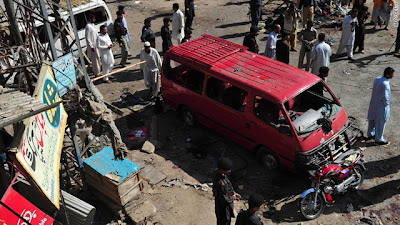Six loud explosions rocked Tripoli late on Tuesday within 10 minutes, following powerful strikes 24 hours earlier, including one on Gaddafi's complex in which Libyan officials said 19 died. Obama told a London news conference with British Prime Minister David Cameron he could not predict when Gaddafi, who is fighting a three-month-old insurgency, might be forced to go.
"I absolutely agree that, given the progress that has been made over the last several weeks, Gaddafi and his regime need to understand that there will not be a let-up in the pressure that we are applying." "We have built enough momentum that, as long as we sustain the course that we are on, that he is ultimately going to step down," he said. "Ultimately this is going to be a slow, steady process in which we are able to wear down the regime."
Fighting between Gaddafi's forces and rebels has reached a stalemate, despite two months of NATO aerial support under a U.N. mandate intended to protect civilians. Gaddafi denies that his troops target civilians and says the rebels are criminals, religious extremists and members of al Qaeda. Strikes drove back Gaddafi's forces shortly after he pledged "no pity, no mercy" to rebels in their stronghold of Benghazi.
But since then, the rebels have been unable to achieve any breakthrough against better- trained and -equipped forces. "TURNING UP PRESSURE" Cameron echoed Obama's calls for Gaddafi to go. "I believe we should be turning up that pressure and on Britain's part we will be looking at all the options of turning up that pressure," he said. But Obama reiterated that NATO ground troops were not an option, saying: "We cannot put boots in the ground in Libya."
French Foreign Minister Alain Juppe said on Tuesday the NATO bombing should achieve its objectives within months. France plans to deploy attack helicopters for more precise attacks on pro-Gaddafi forces embedded among civilians. Britain said on Tuesday it was considering doing the same.
The rebel-held town of Zintan, 150 km southwest of Tripoli in the Western Mountains, was hit by shelling on Wednesday, a witness there said. Rebel spokesman Abdulrahman said Gaddafi's forces were firing from Zawiyat al Baghoul, 18 km to the east. Rebel fighters say Gaddafi's forces fire salvos into Zintan, then drive their truck- mounted rocket batteries into abandoned structures in Zawiyat al Baghoul to evade detection by NATO.
They also say the troops are using new types of Grad rockets, including Chinese- made Grads that spread flechettes when they explode to kill as many as possible. Doctor Anja Wolz of Doctors Without Borders said a relocation of the hospital in Zintan was being considered. "For three days now we've had rockets landing near the hospital," she told Reuters by satellite phone from Zintan.
"We're looking for a back-up place for the hospital. My feeling is it's becoming a target." Libyan television quoted a military source as saying civilian and military sites in the Western Mountains town of Nalut had been hit by NATO.
TRIPOLI BOMBED In the second night of heavy NATO bombing of Tripoli, the alliance hit a vehicle storage bunker, a missile storage and maintenance site and a command-and-control site on the outskirts of Tripoli, a NATO official said. Government targets around the besieged rebel-held city of Misrata had also been hit. The Group of Eight world powers were to discuss ways to break the impasse at their summit in France on Thursday and Friday.
Some expectRussia to propose a mediation plan. The Libya government says NATO air strikes on a Gaddafi compound on April 30 killed his son Saif al-Arab, 29, and three young grandchildren. Thousands attended Saif al- Arab's funeral. But Italian Prime Minister Silvio Berlusconi said in a television interview the story appeared to have been fabricated.
"To the coalition ... it appears that this is propaganda and that Gaddafi's youngest son is not in Libya but lives in another country, and also the story of the three grandchildren is unfounded. This is the information we are getting from our services," Berlusconi said in the interview, which was recorded on Wednesday and aired inItaly on Thursday.
South African President Jacob Zuma said he would meet Gaddafi in Tripoli next week on behalf of the African Union. Zuma led an African Union mission to Tripoli in April but the bid to halt the civil war collapsed within hours. Jordan followed France, Italy and Qatar on Tuesday by recognising the rebel National Transitional Council in Benghazi as a legitimate representative of Libya's people, and said it would open an office in the city.
The United States bolstered the credentials of the council as a potential government-in- waiting on Tuesday when a U.S. envoy invited it to set up an office in Washington.





